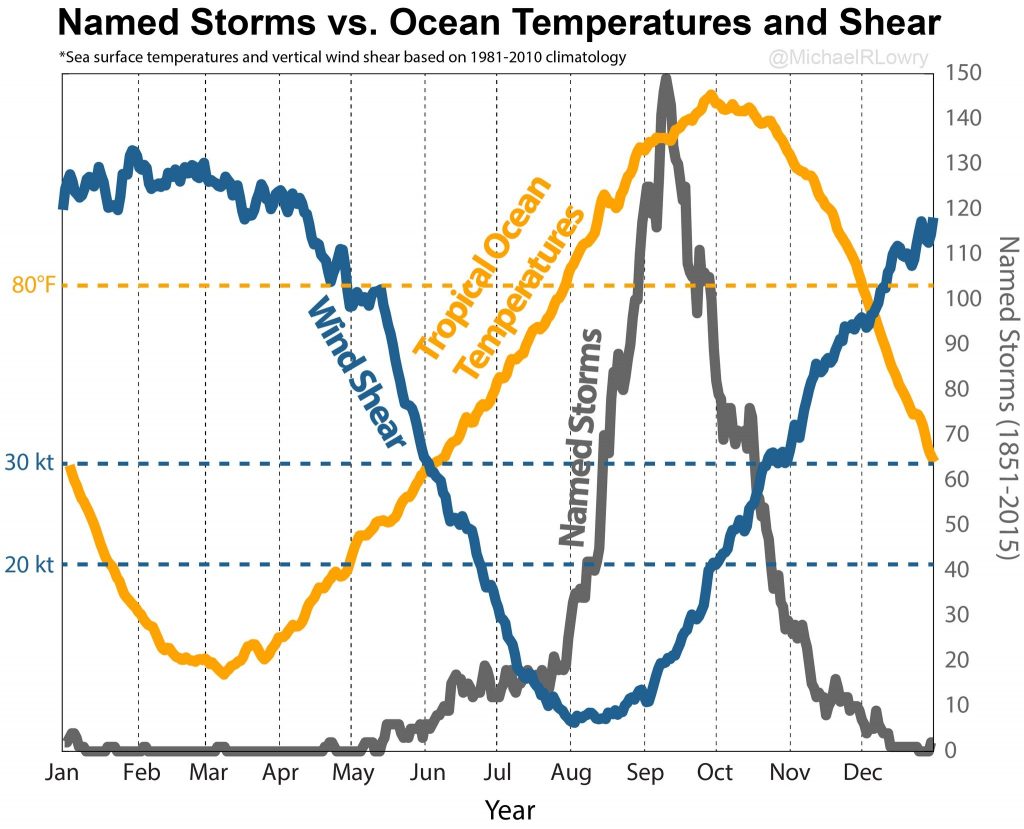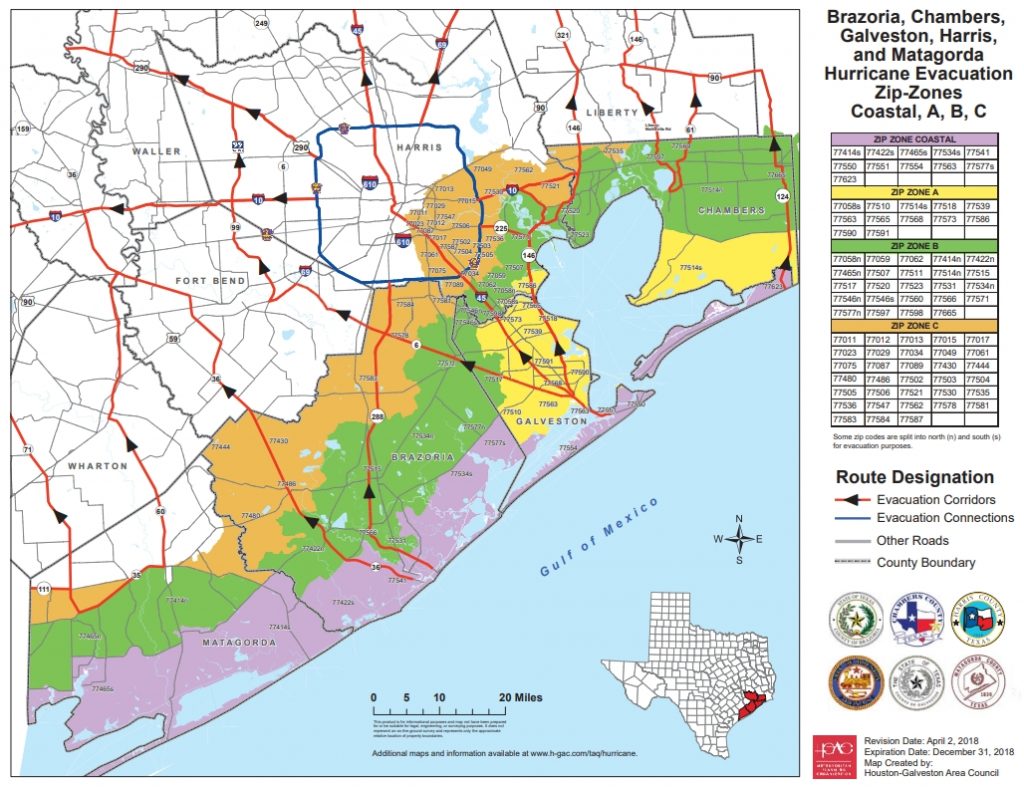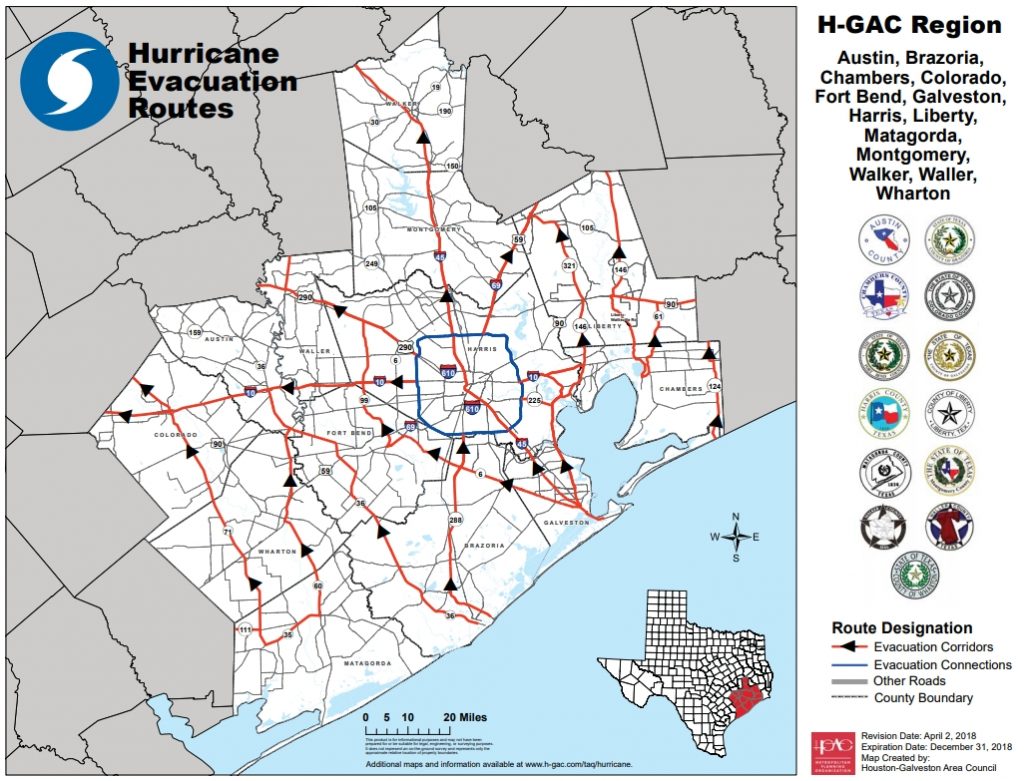Hurricane season officially begins later this week, but as we’ve seen with Subtropical Storm Alberto, Mother Nature doesn’t care overly much about arbitrary dates. Nevertheless, it is the time of year to begin thinking about the tropics, and so we’re going to help you get ready with some questions and answers.
Why does hurricane season occur now?
The easy answer is “warmer water,” and it is true that sea surface temperatures above 80 degrees Fahrenheit are generally needed for tropical storms to form, and strengthen into hurricanes. However, seas in the tropics are generally warmest in October, when hurricane season often begins to wind down. There is another factor, wind shear, that is critical. When winds are rough, and blowing as cross directions at different altitudes, storms simply cannot form. Typically, tropical storms will thrive only when wind shear values near the center are below 20 knots. The following graphic, from FEMA’s Michael Lowry, shows why the hurricane season lasts from June through November, but typically peaks during early September.

Help! I’ve seen a really scary forecast on Facebook
Already this season we’ve seen some hyperbolic forecasts on Facebook. In March, a post forecasting doom and gloom for the 2018 Atlantic season went viral, and more recently a post showing a major hurricane hitting Texas in June got passed around. Such “social mediarology” plays on the fears of people, and therefore tends to get shared widely. If you’ll promise to not fall for these kinds of fear-mongering posts, we’ll make a pledge to you: If we believe there is a credible threat to Houston, we will report that immediately. And if we haven’t written about it, the post you’ve seen on Facebook is probably garbage.
Speaking of the 2018 Atlantic season, what’s going to happen?
The short answer is, no one really knows. There aren’t any particularly strong indicators for the coming season so, outside of a scientific curiosity, the outlook probably doesn’t mean a whole lot.
If a storm comes this way, should I evacuate?
There’s a map for that. Essentially, when a storm threatens, the mayors and county judges of the region will call for evacuations. Depending on where you live, the more likely you’ll be called to leave. The more threatening the storm (i.e. the more powerful the storm surge) the more people will be called upon to evacuate.

What are the evacuation routes, again?
Here’s another map for you. Click the link for a much bigger, zoomable map. Note that these are not mandatory routes, but rather suggested routes.

After Harvey, I’m really nervous
Hey, we get that. In fact, we’ve heard from a lot of people who still get twitchy every time they hear hard rain. So Matt and I have come up with a new flood scale that should help people understand how concerned they should be about heavy rain when it is forecast. We’re planning to introduce this scale, which ranks the flood potential of an event from Stage 1 through Stage 5, in a couple of weeks. (Don’t worry, it’s probably not going to rain until then.) Anyway, our hope with this is that people will understand that not every event is going to be Harvey-like, or close to Harvey like. We’re pretty excited about this, and think that it should really help with Harvey-related anxiety.
Sponsor note
As we head into hurricane season, we’d just like to remind you of our strong partnership with Reliant this year. They will continue to bring you the entire site entire free, and free of advertising, for the duration of hurricane season.
Hurricane Harvey forever changed lives and communities along our state’s Gulf Coast and beyond. But through it all, Harvey also reminded us that even when skies are their darkest, Texans stand strong together. During and after a severe weather event, the Reliant Storm Center is a good resource to check during weather events for information on finding shelters, recovery after storms and other important regional information.
If you have additional questions about the upcoming hurricane season, please ask them below. We’ll do our best to answer them.

Thanks again guys! I am one of those that freaks out at the sign of heavy rain… Growing up in Southern Louisiana I have lived through 48 years of Cat 3,4, and 5, NEVER dealt with the flooding Houston has seen… Memorial Day, Tax Day and Harvey did a real number on me. You guys have kept me sane. Thank you!!!!!!
I’m with you, See! And thanks, Space City Weather Guys, for keeping it real. I’ll be staying closely tuned.
Thanks for the great job you guys do. We “discovered” you last year at the beginning of the hurricane season and your coverage of everything weather related is great. Thanks for the comments regarding social media reporting of storm projections. So often it seems like social media and mainstream weather media thrives off of sensationalist stories rather than rational truths. Keep up the good work and thanks again.
Glad you found us, Ron.
Love Space City Weather! Thanks for telling it like it is. I’ve told so many people about you, hoping to calm them down after they’ve been shaken by doom and gloom reports. Reliant Energy, I’ve always been a customer. (P.S. How about a break for senior citizens?)
Super pumped for the flood scale to be unveiled! Thanks for all you guys do to keep our communities informed. And thanks also, Reliant!
You’re most welcome!
Thanks so much for your accurate information. It’s very much appreciated!
Thanks Eric!!! I appreciate your frank, honest and clear information.
“If you’ll promise to not fall for these kinds of fear-mongering posts, we’ll make a pledge to you: If we believe there is a credible threat to Houston, we will report that immediately. And if we haven’t written about it, the post you’ve seen on Facebook is probably garbage.”
Thank you guys.
Simply brilliant.
I’d like to think that 20 years from now, Harvard Business School will have a case study about how two meteorologists from Houston brought sense to news and social media.
Thank you for all your work. It is greatly appreciated.
“And if we haven’t written about it, the post you’ve seen on Facebook is probably garbage.”
This is so true of ALL the social media sites, and not only bogus weather warnings. I refuse to let these sites sell my personal information to make a profit, so I haven’t joined them.
You guys are the best! Thanks for the no-hype reporting!
Thanks for your no-hype, fact based assessment of our weather. It is great to have a “best guess” forecast that puts hurricane season and hurricanes in the proper perspective.
Do you know if the local governments have any idea if the massive gridlock caused by the Hurricane Rita evacuation is likely to reoccur?
After Rita, the state of Texas created a task force to look at problems related to the evacuation, and the implemented some important changes including contraflow, the pre-positioning of gasoline supplies and better coordination. These measures will help, I believe. But if you’re trying to get 2-3 million people out of an area within 24-48 hours you’re going to have some problems no matter what.
Great post and thanks for the sanity check.
Face _____ Who? Posts are so invalid in the majority of serious topics that I would completely ignore that prognostications and stick with My Guys at Space City Weather. And for those of you who wonder, even my Border Collie, Sarah, agrees with me.
Thank you again for your wisdom, vigilance and reporting, and obviously, your accuracy!!
Matt and Eric,
I cannot thank you enough for the facts you provide. And, the flood scale? Cannot wait to see that as will help with unnecessary anxiety.
Appreciate all of your hard work to ‘tell it like it is’!
I like the idea of a 5-stage flood alert but after last year, one that includes stages one through five with a 10 added (six stages total) makes more sense. One through five for everything else and 10 reserved for a Harvey-like event.
I’m only half kidding.
THANK YOU!!!
Thanks for all the work you do, and for keeping us informed without the hype.
I’ve been following your posts since you were the chronicle sci-guy, and never trusted anyone else ever since. Thanks!!
Just want to let you two gents know how nice it is to get NO-HYPE weather information. As you so aptly put in the 5/29 blog, if you guys haven’t written about it , I tend to not believe what others are posting on FB or what the TV guys are spouting. Keep up the good work!!!!!
Thank you for your excellent weather reporting. I really appreciate having a reliable and even keel information source. And thank you to Reliant for sponsoring without ads!
Thank you, Eric and Matt, thank you to your families for the sacrifices they surely make when the weather turns nasty and thank you to Reliant and all other Space City Weather sponsors who preceded them!
Eric and Matt…it’s reassuring to me to see people paying attention to real opinions and data…i.e., you guys!…can’t wait for the fake news and hype era to be a thing of the past…your followers are good people wanting to deal with truth…thanks for a being there for us truth/no hype believers…and thanks to Reliant for being a sponsor…
Hi Milt, and thanks!
Thanks for all you do! The flood scale will be a great help. You might also remind folks about the Harris Country Flood Warning System website and how to look up the Stream Elevation Sensor at their closest bayou. Out of habit, I still check the Braes sensor at Rice when we have a rain event, even though I’ve relocated away from The Meyerland area.
Best weather report ever! Finally some sanity.
This may be a silly question, but: why does the wind shear graph show such a steep decline in May through July, and then the rise in September through December? What causes that?
One of the main reasons is that the jet stream pulls north during the summer months, reducing some of the variation in wind speeds at altitude.
Wouldn’t just reading the national weather service forecast be the same thing? Also accuweather and the National Hurricane center website. All hype free. You guys aren’t reinventing the wheel here.